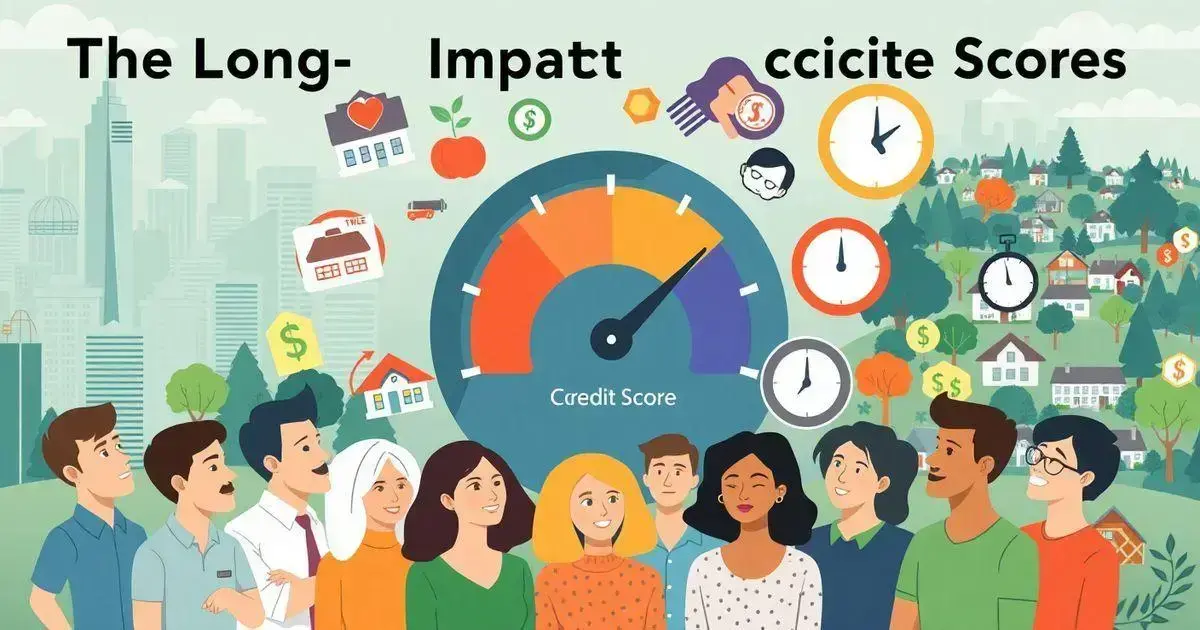Credit scores and their impact are felt in many areas of your financial life. Whether you’re applying for a loan, renting an apartment, or even looking for a job, your score is a key factor. It reflects your financial responsibility and affects the trust others place in you.
The components that make up your credit score, such as payment history and credit utilization, are crucial to understand. The higher your score, the better rates and opportunities you’ll have when borrowing money.
Maintaining a good credit score can save you money and open doors to better financial products. Curious about how to improve your score? Read on to discover easy ways to boost and maintain a healthy credit score.
What is a Credit Score?
A credit score is a number that represents your creditworthiness. It is calculated based on your credit history, including factors such as your payment history, the amount of debt you owe, and how long you’ve had credit. Generally, credit scores range from 300 to 850, with higher scores indicating better credit.
Credit scores and their impact can help you manage your financial decisions more effectively. Lenders look at your credit score to decide whether to give you a loan or credit, and what interest rates to charge. A good credit score can lead to lower interest rates, which means you pay less money over time.
Your credit score can impact renting an apartment, as landlords often check credit scores to assess potential tenants. Employers may also consider your credit score when evaluating candidates for certain positions, especially in finance-related roles. Therefore, credit scores and their impact are crucial for various aspects of your life.
How Credit Scores are Calculated

Credit scores are calculated using information from your credit report. This includes factors like your payment history, amounts owed, length of credit history, types of credit in use, and recent credit inquiries.
Credit scores and their impact are determined largely by payment history, which makes up about 35% of your score. Missing payments can significantly lower your score.
Next, the amounts owed make up 30%, which considers how much credit you’re using compared to your total credit limit. It’s best to keep your credit utilization below 30%.
The length of credit history accounts for 15%, rewarding longer histories of responsible credit use.
The types of credit in use contribute 10%, meaning a mix of credit cards, mortgages, and other loans can benefit your score.
Finally, new credit inquiries impact 10%, indicating that too many hard inquiries within a short period can negatively affect your score.
Understanding these components can help you manage and improve your credit score effectively, as credit scores and their impact are key to shaping your financial opportunities.
Factors Affecting Your Credit Score
Several factors can affect your credit score. These include payment history, which is crucial because it shows whether you pay your bills on time. About 35% of your score is based on this factor.
Credit scores and their impact are also influenced by your credit utilization, which refers to how much credit you’re using compared to your limit. It makes up 30%, and it’s generally best to keep your utilization under 30% to maintain a healthy score.
The length of credit history accounts for 15%. Having a longer credit history can positively influence your score.
Additionally, the types of credit you have, such as credit cards and loans, contribute to 10% of your score. A diverse credit mix can be beneficial.
Finally, new credit inquiries make up the last 10%. When you apply for new credit, it can result in a hard inquiry, which may lower your score temporarily.
Understanding these factors can help you manage and improve your credit score effectively, as credit scores and their impact are significant when it comes to making informed financial decisions.
The Importance of a Good Credit Score

A good credit score is extremely important in today’s financial world. Credit scores and their impact can influence your ability to get loans, credit cards, and even mortgages. Lenders use your credit score to assess your risk as a borrower. A score above 700 is generally considered good, while a score below 600 may make it more difficult to secure financing.
With a higher credit score, you can qualify for lower interest rates, which can save you considerable money over time. Additionally, having a good credit score gives you access to better credit options and can help you in renting an apartment or securing a job, as some employers check credit history.
Therefore, maintaining a good credit score should be a priority for anyone who wants to achieve financial stability and access various financial products. Credit scores and their impact extend beyond just loans—they touch every aspect of your financial life.
How to Improve Your Credit Score
Improving your credit score is essential for financial health. Credit scores and their impact are significant when it comes to qualifying for loans, securing favorable interest rates, and even job opportunities. There are several effective ways to boost your score.
First, pay your bills on time, as payment history accounts for 35% of your score. Set reminders or automate payments to avoid late fees.
Second, monitor your credit utilization ratio by keeping it below 30%. This means not using more than 30% of your available credit.
Third, review your credit report for inaccuracies. If you find errors, dispute them with the credit bureau.
Additionally, keep old credit accounts open, as a long credit history positively affects your score.
Diversifying your credit with different types can also help, so consider having a mix of credit cards and loans.
Lastly, avoid applying for many new credits at once, as hard inquiries can temporarily lower your score.
By following these steps, you can gradually improve your credit score and enhance your financial opportunities. Credit scores and their impact can unlock doors to better financial products and savings in the long run.
Common Myths About Credit Scores

Many people hold misconceptions about credit scores that can impact their financial decisions. Credit scores and their impact are often misunderstood, leading to poor choices. One common myth is that checking your own credit score will hurt it. This is not true; this is known as a soft inquiry and does not affect your score.
Another myth is that closing old credit accounts will improve your score. In reality, it can lower your score by reducing your credit history length and increasing your credit utilization ratio.
Some believe that only banks can improve their credit score, but anyone can do it by managing their accounts responsibly.
Another common myth is that having a credit score means you’re in debt. However, many people with high scores manage their credit cards well and pay off their balances in full each month.
Finally, some think that paying off a collection will remove it from their credit report, but collections can remain for up to seven years even if paid.
Understanding these myths is crucial for maintaining a healthy credit score. Credit scores and their impact are central to your financial health, so knowing the truth can help you make better financial decisions.
Understanding Credit Reports
A credit report is a detailed record of your credit history prepared by a credit bureau. It includes personal information, such as your name, address, and Social Security number.
Your credit report lists your credit accounts, payment histories, and any outstanding debts. Credit scores and their impact can be seen clearly through this report, as it directly influences the score that lenders use to evaluate you.
There are three major credit bureaus: Equifax, Experian, and TransUnion. Each agency collects and maintains your credit information.
It’s important to review your credit report regularly to ensure that all information is accurate and that there are no errors that could harm your credit score.
You are entitled to one free credit report per year from each of the three bureaus, which you can obtain by visiting AnnualCreditReport.com.
Understanding your credit report is vital because lenders use it to evaluate your creditworthiness when you apply for loans or credit. Credit scores and their impact are a crucial part of this evaluation, so it’s essential to stay informed.
The Long-Term Impact of Credit Scores

The long-term impact of credit scores can shape your financial future in many ways.
A high credit score often leads to better loan terms, lower interest rates, and increased access to credit. Credit scores and their impact are especially significant when it comes to major financial decisions.
For instance, if you have a strong credit score, lenders may be more willing to approve larger loans, such as for a mortgage or car. With better terms, you can save money over time.
Additionally, businesses often check credit scores when deciding to extend credit for purchases or services. A good credit score can lead to favorable conditions for both personal and business transactions.
Maintaining a good credit score can also help you save money over time, as individuals with higher scores typically pay less in interest. Credit scores and their impact are a key factor in determining your financial flexibility.
On the other hand, a low credit score can result in higher costs and fewer opportunities. It may limit your ability to obtain loans or force you to accept less favorable terms.
Therefore, understanding and managing your credit score over time is crucial for achieving financial goals.
In Conclusion: The Importance of Understanding Credit Scores
Understanding credit scores and their impact is essential for maintaining financial health. They play a vital role in loan approvals, interest rates, and even job applications.
By learning how credit scores are calculated and the factors that affect them, you can take proactive steps to improve and maintain your score.
Debunking common myths about credit scores can also empower you to make informed financial decisions. Remember that a good credit score opens doors to credit opportunities and savings.
Thus, consistently managing your credit habits can lead to long-term financial success. Stay informed, and be diligent in monitoring your credit to ensure you make the best financial choices for your future.

